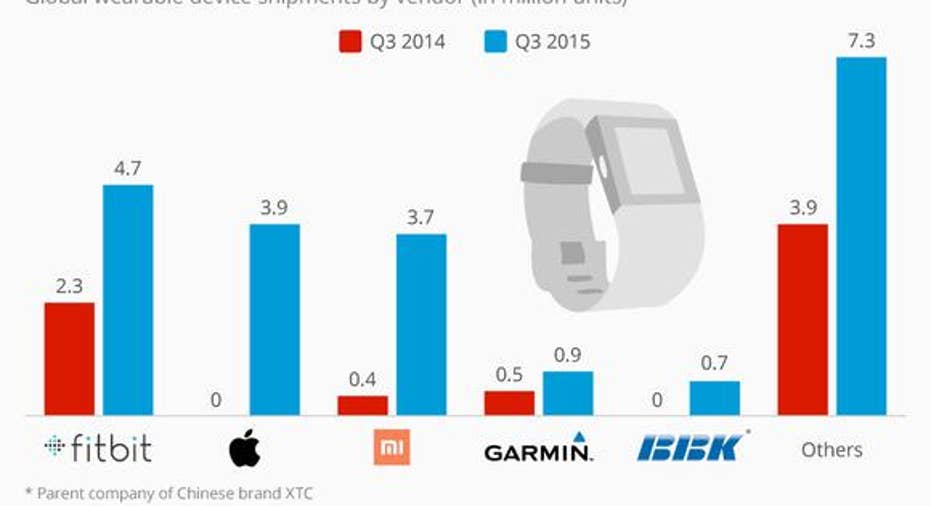Fitbit Inc. Is Still King of the Wearables

The overriding theme when research firm IDC issued its 2015 Q2 wearables sales report a few months ago wasn't that Fitbit was the undisputed leader, though it was. The story was the debut of Apple and its much-hyped Watch at No. 2 on the list of top wearable vendors. Considering its Watch was only sold in limited markets when it was first introduced and third-party vendors were still being lined up, Apple's first foray into the wearables market was a strong one.
Which helps to explain why IDC prefaced its Q2 wearables sales report with "Apple finds itself within striking distance of the established market leader, Fitbit." The underlying gist of IDC's report -- and likely that of many Apple fans -- was that it's a matter of when, not if, the Watch knocks Fitbit off its throne. Turns out, iFans will need to wait at least another quarter, and likely longer if holiday sales estimates prove accurate, to claim the top prize.
Image courtesy of Statista.
Just the factsFitbit sales in the third quarter rose to 4.7 million wearable devices shipped, more than twice that of 2014's Q3, keeping it firmly entrenched as the top dog. To Apple's credit, its second quarter of Watch availability ended with 3.9 million units shipped, earning it 18.6% of the market. To put that into perspective, Fitbit boasts 22.2% of all wearable sales, down slightly from the previous quarter, just as Apple's market share was.
Interestingly, Fitbit and Apple both increased wearable sales in Q3 by identical 300,000 units, maintaining the same 800,000 difference the two had in the prior quarter. Also of note were the sales volume of China-based Xiaomi and its low-cost Mi band. With 3.7 million units shipped, Xiaomi is narrowing the gap with Apple thanks to its strong position in China, which accounted for "more than 97%" of its volumes" in Q3.
In addition to its early entry into the wearables market, Fitbit's ongoing success is attributed to a couple factors. One, its emphasis on a corporate wellness sales strategy is already paying off handsomely. In fact, the 300,000 jump in sales in Q3 compared to the prior quarter? A new retail customer with a wellness program ordered a whopping 335,000 Fitbit bands for its employees in Q3, joining a long list of heavyweights in multiple industries.
Secondly, emerging markets continue to be an area of growth, as Fitbit demonstrated last quarter when it announced earnings. The U.S. still drives the majority of revenue, but the Asia/Pacific, Europe, Middle East, and Africa (EMEA), along with "Other Americas," regions all grew more than twice as fast as U.S. sales. Fitness tracking is going mainstream, and Fitbit is aggressively fighting to keep its leadership position.
Apples vs. orangesApple Watch is more than a fitness tracker -- it's also a pager, with some downloadable apps and a limited communications device. And in that regard, Apple Watch is the hands-down leader, which could be an opportunity if it's able to carve out a niche, much like Fitbit's done in the fitness and corporate wellness markets.
Continually updating the Apple Watch operating system, as Apple did last quarter when it released watchOS 2, will help it realize more of the device's "smart" capabilities, further distancing itself from the Fitbits of the world. But even that may not push Apple over the top. It may have to do the unthinkable: push its low-end, low-cost Watch to up its user base and hope they upgrade at some point. Why? Last quarter may prove to be a sign of things to come.
IDC credits much of Apple's sales bump in Q3 to consumer interest in its least expensive Sport line. Which should come as no surprise, given that Fitbit's low-cost fitness tracking band is what consumers appear to want, rather than write a $550 check or more for an Apple Watch with rarely used non-fitness related features.
Analysts are expecting Fitbit to report a blowout Q4 holiday shopping season, one describing its fitness band as "this year's hot holiday gift." It's no wonder the vast majority have a buy or better rating on Fitbit stock, not to mention a $50.53-per-share consensus price target. It's good to be king, and it doesn't appear Fitbit will give up its crown anytime soon.
The article Fitbit Inc. Is Still King of the Wearables originally appeared on Fool.com.
Tim Brugger has no position in any stocks mentioned. The Motley Fool owns shares of and recommends Apple. Try any of our Foolish newsletter services free for 30 days. We Fools may not all hold the same opinions, but we all believe that considering a diverse range of insights makes us better investors. The Motley Fool has a disclosure policy.
Copyright 1995 - 2015 The Motley Fool, LLC. All rights reserved. The Motley Fool has a disclosure policy.



















